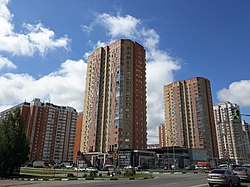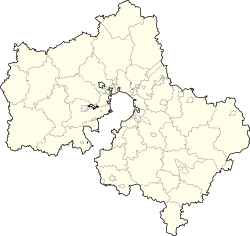Lobnya
Lobnya
Лобня | |
|---|---|
 | |
| Coordinates: 56°01′N 37°29′E / 56.017°N 37.483°E | |
| Country | Russia |
| Federal subject | Moscow Oblast[1] |
| Founded | 1902 |
| Town status since | 1961 |
| Government | |
| • Mayor | Igor Demeshko[2] |
| Elevation | 195 m (640 ft) |
| Population | |
| • Total | 74,252 |
| • Rank | 216th in 2010 |
| • Subordinated to | Lobnya Town Under Oblast Jurisdiction[1] |
| • Capital of | Lobnya Town Under Oblast Jurisdiction[1] |
| • Urban okrug | Lobnya Urban Okrug[4] |
| • Capital of | Lobnya Urban Okrug[4] |
| Time zone | UTC+3 (MSK |
| Postal code(s)[6] | 141730 |
| Dialing code(s) | +7 495 |
| OKTMO ID | 46740000001 |
| Website | www |
Lobnya (Russian: Ло́бня) is a town in Moscow Oblast, Russia, located 30 kilometres (19 mi)[7] north west of Moscow. Population: 82,764 (2021 Census);[8] 74,252 (2010 Census);[3] 61,567 (2002 Census);[9] 60,475 (1989 Soviet census);[10] 30,000 (1970).
History
[edit]Lobnya was founded in 1902 and granted town status in 1961.[citation needed]
Krasnaya Polyana in the Battle of Moscow
[edit]This article possibly contains original research. (November 2016) |
The German attack starting the Battle of Moscow (code-named ‘Operation Typhoon’) began on October 2 1941. The attack on a broad front brought German forces to occupy the village of Krasnaya Polyana (now in the town of Lobnya) to Moscow's North West. Krasnaya Polyana was taken on November 30[11] by Erich Hoepner's 4th Panzer Group.[12] This is accepted by many as the closest point occupied by German forces to Moscow. Less accepted is that this is the closest point visited by Germans to Moscow in the campaign.[13]
Many sources state that at least one German army patrol visited nearby Khimki. Similarly many sources state Khimki as the closest point the Germans reached to Moscow (Khimki at the time was 8 kilometres (5.0 mi) from the edge of Moscow). Among the sources stating the Germans reached Khimki the details of the date and unit involved are inconsistent and disputed. One story of events asserts a skirmish took place in Khimki on October 16 at the Leningradskoye Shosse bridge involving a German motorcycle unit.[13] Another account is a patrol reached Khimki around November 30 or early December before returning to its main unit without combat. The dates mentioned for this second account vary.[14] A myth surrounding this is that the Germans would have been able to see the Kremlin in the distance from Khimki.
The Soviet Army counter offensive for "removing the immediate threat to Moscow" started on December 5 on the North-Western Front (the area around Krasnaya Polyana and Lobnya North West of Moscow). The South-Western Front and Western Fronts began their offensives on December 6. The German forces were driven back. Moscow was never under such close land threat again during the war.
Administrative and municipal status
[edit]Within the framework of administrative divisions, it is incorporated as Lobnya Town Under Oblast Jurisdiction—an administrative unit with the status equal to that of the districts.[1] As a municipal division, Lobnya Town Under Oblast Jurisdiction is incorporated as Lobnya Urban Okrug.[4]
Architecture
[edit]The environs are rich in architectural monuments, such as the Neo-Gothic estate of Marfino located 9 kilometers (5.6 mi) to the northeast, which was laid out by Field Marshal Pyotr Saltykov in the 1770s but was extensively modernized by Count Panin in 1837–1839. The palace is Gothic in style, scored to resemble a medieval castle; a flight of stairs connects it with a white-stone wharf by the river, decorated with statues of griffins. To the west from the palace stands the Petrine Baroque church of the Virgin's Nativity (1701–1707). There are also a Gothic bridge, stables, and two English parks with picturesque rotundas.
Within two kilometers from Marfino is the manor of Nikolskoye-Prozorovskoye, which contains a Neo-Baroque country house of Field Marshal Prozorovsky and a Neoclassical church of St. Nicholas, built in the 1790s. Nearby is Rozhdestveno-Suvorovo, where the five-domed church of the Virgin's Nativity was built by Princes Baryatinsky at the turn of the 18th century. In 1773, the estate passed to Alexander Suvorov's father, Vasily Suvorov, a general-in-chief who is buried in the church.
The oldest building in the vicinity is the five-domed four-pillared apseless Trinity Church in Chashnikovo (four kilometers from Lobnya). Its elegant Italianate decor, reminiscent of the Chudov Monastery cathedral, dates the church to the early years of the 16th century, when such Italian architects as Aloisio the New were active in Russia. The church was first documented in 1585, when Chashnikovo was owned by Nikita Romanov, grandfather of Tsar Mikhail I. By the end of the 17th century, the estate had passed to Lev Naryshkin, maternal uncle of Peter the Great, who added a bell tower and had the church's decor updated to answer his own Naryshkin Baroque tastes.
Other well-known villages in the vicinity of Lobnya are Zhostovo (seven kilometers to the northeast) and Fedoskino (ten kilometers to the east), renowned for their traditional folk crafts of Zhostovo painting and Fedoskino miniature, respectively.
-
St. Nicholas church in Prozorovskoye
-
Church of the Holy Mandylion in Kiovo, Lobnya
Notable people
[edit]- Mikhail Mishustin (b. 1966), Russian politician (Prime Minister of Russia)
References
[edit]Notes
[edit]- ^ a b c d e Law #11/2013-OZ
- ^ "Совет депутатов избрал Игоря Демешко главой Лобни". minter.mosreg.ru. Ministry of Territorial Policy of the Moscow Oblast. October 28, 2022. Retrieved March 4, 2024.
- ^ a b Russian Federal State Statistics Service (2011). Всероссийская перепись населения 2010 года. Том 1 [2010 All-Russian Population Census, vol. 1]. Всероссийская перепись населения 2010 года [2010 All-Russia Population Census] (in Russian). Federal State Statistics Service.
- ^ a b c Law #21/2005-OZ
- ^ "Об исчислении времени". Официальный интернет-портал правовой информации (in Russian). June 3, 2011. Retrieved January 19, 2019.
- ^ Почта России. Информационно-вычислительный центр ОАСУ РПО. (Russian Post). Поиск объектов почтовой связи (Postal Objects Search) (in Russian)
- ^ "Distancia entre Lobnya Moscow Oblast Russia y Moscow Russia". distancescalculator.net. Retrieved August 21, 2017.
- ^ Russian Federal State Statistics Service. Всероссийская перепись населения 2020 года. Том 1 [2020 All-Russian Population Census, vol. 1] (XLS) (in Russian). Federal State Statistics Service.
- ^ Federal State Statistics Service (May 21, 2004). Численность населения России, субъектов Российской Федерации в составе федеральных округов, районов, городских поселений, сельских населённых пунктов – районных центров и сельских населённых пунктов с населением 3 тысячи и более человек [Population of Russia, Its Federal Districts, Federal Subjects, Districts, Urban Localities, Rural Localities—Administrative Centers, and Rural Localities with Population of Over 3,000] (XLS). Всероссийская перепись населения 2002 года [All-Russia Population Census of 2002] (in Russian).
- ^ Всесоюзная перепись населения 1989 г. Численность наличного населения союзных и автономных республик, автономных областей и округов, краёв, областей, районов, городских поселений и сёл-райцентров [All Union Population Census of 1989: Present Population of Union and Autonomous Republics, Autonomous Oblasts and Okrugs, Krais, Oblasts, Districts, Urban Settlements, and Villages Serving as District Administrative Centers]. Всесоюзная перепись населения 1989 года [All-Union Population Census of 1989] (in Russian). Институт демографии Национального исследовательского университета: Высшая школа экономики [Institute of Demography at the National Research University: Higher School of Economics]. 1989 – via Demoscope Weekly.
- ^ https://www.youtube.com/watch?v=olYUrlIfWg0 43 min 45 s into this "The World at War2 Episode 5"
- ^ https://www.youtube.com/watch?v=DYUzmBuX-6Y&feature=youtu.be&t=142 2:22 into the video
- ^ a b Axis History
- ^ Axis History
Sources
[edit]- Московская областная Дума. Закон №11/2013-ОЗ от 31 января 2013 г. «Об административно-территориальном устройстве Московской области», в ред. Закона №249/2019-ОЗ от 29 ноября 2019 г. «О внесении изменений в Закон Московской области "Об административно-территориальном устройстве Московской области"». Вступил в силу на следующий день после официального опубликования (13 января 2013 г.). Опубликован: "Ежедневные Новости. Подмосковье", №24, 12 февраля 2013 г. (Moscow Oblast Duma. Law #11/2013-OZ of January 31, 2013 On the Administrative-Territorial Structure of Moscow Oblast, as amended by the Law #249/2019-OZ of November 29, 2019 On amending the Law of Moscow Oblast "On the Administrative-Territorial Structure of Moscow Oblast". Effective as of the day following the day of the official publication (January 13, 2013).).
- Московская областная Дума. Закон №21/2005-ОЗ от 19 января 2005 г. «О статусе и границе городского округа Лобня», в ред. Закона №133/2008-ОЗ от 23 сентября 2008 г «О внесении изменений в Закон Московской области "О статусе и границе городского округа Лобня"». Вступил в силу со дня официального опубликования. Опубликован: "Ежедневные Новости. Подмосковье", №22, 8 февраля 2005 г. (Moscow Oblast Duma. Law #21/2005-OZ of January 19, 2005 On the Status and the Border of Lobnya Urban Okrug, as amended by the Law #133/2008-OZ of September 23, 2008 On Amending the Law of Moscow Oblast "On the Status and the Border of Lobnya Urban Okrug". Effective as of the day of the official publication.).
External links
[edit]- Official website of Lobnya (in Russian)
- Unofficial website of Lobnya (in Russian)







